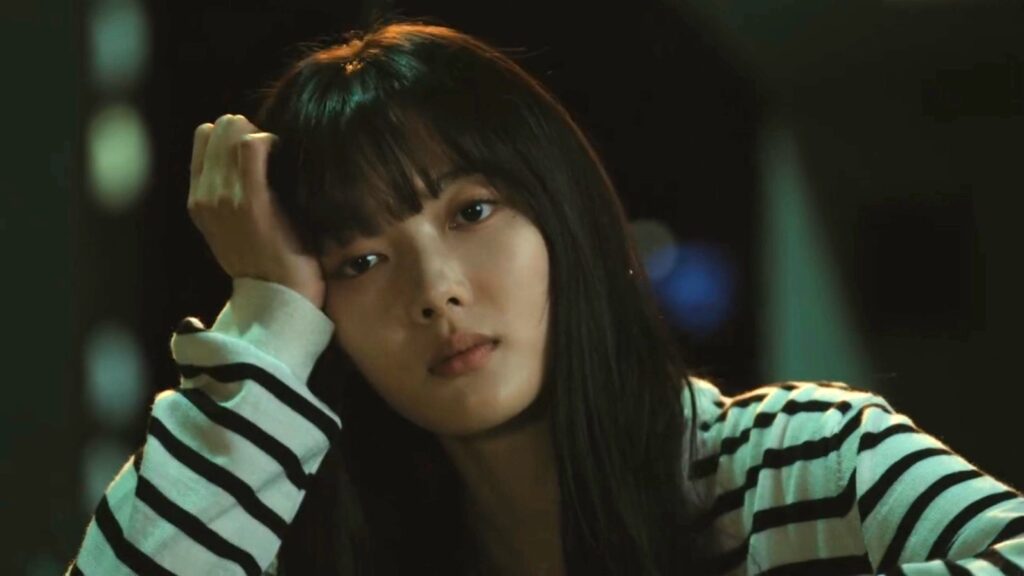Dear X opens hard and fast. It’s tense. It’s grim. It’s the kind of K-drama that makes you want to peek through your fingers — then rewatch the scene five minutes later. Kim Yoo-jung owns the role of Baek Ah-jin: cold, clever, and terrifying in the best way. These first four episodes build her origin story like a crime novel. You get trauma, manipulation, and a ruthless rise to fame. If you like moral messes wrapped in glamour, this one’s for you.

TL;DR
- Dear X is a bleak, sharp, psychological thriller focused on the ruthless rise of antihero Baek Ah-jin.
- The first four episodes build Ah-jin’s traumatic origin story: detailing her abuse, manipulation tactics, and eventual leap to fame.
- Ah-jin uses people as tools: most notably Yoon Joon-seo (her loyal fixer) and Kim Jae-oh.
- The major climax involves Ah-jin framing a kind man (Jung-ho) and letting Joon-seo take the fall for a crime to secure her escape and stardom.
- Key themes are power, survival, and moral consumption. The tension comes from watching her succeed despite her monstrous methods.
What happens in episodes 1–4 (spoiler-heavy)

From the first frame, the show sets a mood: bleak, sharp, and unflinching. Ah-jin grows up in an abusive home. Her father, Baek Sun-gyu, is violent and vile. Her mother is drunk and helpless. Young Ah-jin literally steps over her injured mother. It’s brutal, and the series doesn’t shy away from that cruelty.
Ah-jin survives. She learns to use people. She studies people. She makes them useful. Early on, she finds leverage: secrets about Yoon Joon-seo’s family. She uses it to avoid being sent to an orphanage. From there, Joon-seo becomes her ally — and her fixer. Their bond is twisted, loyal, and fragile.
High school is where Ah-jin sharpens her tactics. She gets rid of a rival, Shim Sung-hee, with a plan so cold it clicks into place like clockwork. Ah-jin manipulates classmates, teachers, and a few boys who desperately need someone to believe in them — namely Jae-oh. Together they gaslight and destroy Sung-hee’s reputation. It’s cruel, efficient, and textbook sociopathy.
Plans collapse. Her father returns, steals their college money, and beats her. Jae-oh ends up killing his abusive father and goes to prison. Ah-jin’s dreams of a university law degree vanish. She takes a café job and blows up into stardom after photos of her go viral. Fame comes with danger: a stalker attacks her. Joon-seo shows up. He cleans up the mess. He covers tracks. He confesses to a murder he didn’t commit so Ah-jin can escape. She uses a kind man, Jung-ho, to finish her plan. He gets framed. Joon-seo takes the fall. Ah-jin leaves to become a star and cuts Joon-seo loose.
Now, present day, Ah-jin is famous. She’s also slippery and dangerous. The show ends these early episodes with her at the top of the world — and the rest of us wondering when, how, and to whom the wreckage will catch up.
Characters and the chemistry that works

- Baek Ah-jin (Kim Yoo-jung): The show’s axis. She’s brilliant and chilling. Kim Yoo-jung plays her with a flat, surgical calm that makes every choice look inevitable. Ah-jin isn’t cartoon evil. She’s created by cruelty. That makes her both repulsive and strangely magnetic.
- Yoon Joon-seo (Kim Young-dae): Loyal, guilt-ridden, and wrecked by love. He’s the classic fixer who keeps getting pulled deeper. His devotion feels real. It also feels unstoppable — and risky.
- Kim Jae-oh (Kim Do-hoon): Angry, damaged, grateful. He follows Ah-jin because she gives him power and respect. That’s a dangerous mix for anyone.
- Choi Jung-ho (Kim Ji-hoon): Kind, naive, manipulated. He’s the tragic instrument in Ah-jin’s plan. The show uses him to show how easily good people can become collateral.
The chemistry among the trio (Ah-jin, Joon-seo, Jae-oh) is the show’s emotional engine. Their loyalty and betrayals carry real weight. The show doesn’t rely on romantic beats to create tension. It uses codependency, guilt, and power.
Themes and tone

This is a thriller about power, survival, and consumption. The show asks: what does someone become when every adult they’ve relied on fails them? The answer here is sharp and uncompromising. Ah-jin is a product of violence and neglect, and she turns those scars into strategy.
Tone-wise, it’s dark but stylish. The cinematography loves close-ups. The score is sparse. The mood is claustrophobic in the best way. This is not a comfort watch. It’s a study of cruelty and control.
Pacing and storytelling

The first four episodes favor setup over payoff. That’s intentional. We get long arcs of manipulation and small scenes that reveal how Ah-jin plans ahead. Scenes are compact. Dialogue is lean. The show trusts its actors to carry the weight. The payoff is promise rather than immediate reward. If you want constant action: slow your expectations. If you like slow tension building to an inevitable snap, you’ll be hooked.
What the show does well
- Character work: Ah-jin is complex. The writers let her be monstrous and human at once.
- Atmosphere: The series creates a steady, oppressive mood.
- Moral ambiguity: You root for survival even as you recoil from the methods.
- Performances: Kim Yoo-jung’s performance is the stand-out. The supporting cast matches her well.
What could be better

- The show is brutal. If you’re sensitive to child abuse and heavy emotional manipulation, this may be too much.
- Some plot moves feel engineered to shock rather than to develop character. It’s fine for thrills, but it can feel a little too neat when crimes line up like dominoes.
My point of view (straight talk)
I love a female lead who breaks the mold. Ah-jin isn’t written as trendy evil. She’s real in the sense that her choices feel inevitable given what she endured. The show smartly refuses to moralize early on. Instead, it lets us watch cause and effect. That tension — wanting her to succeed while fearing what her success costs — is what kept me glued.
Also: the moral cost will be the show’s long game. My bet? Ah-jin’s empire will fracture because relationships built on manipulation can’t hold forever. People she hurt will come back. Loyalties will betray her. That’s the delicious part. Watching the walls she built from fear and lies slowly crack is the payoff I’m waiting for.
Favorite moments (no spoilers beyond episode 4)
- The school takedown of Sung-hee. Cold, efficient, and so well-executed.
- Joon-seo’s confession scene. Painful and paradoxical.
- Ah-jin’s café-to-stardom leap. It’s a small moment with huge consequences.
Who should watch this
- Fans of psychological thrillers.
- Viewers who like morally gray antiheroes.
- People who appreciate character-driven plots over action.
Avoid if you’re sensitive to child abuse, domestic violence, or graphic cruelty.
Final verdict

Dark, unsettling, and compelling. The first four episodes set a slow-burning trap that keeps snapping inward. Kim Yoo-jung gives a career performance. The world-building is tight. The moral questions are messy. And that’s the point.
Rating: ★★★★☆ (4 out of 5 stars)
Reason: Bold, well-acted, and engrossing. Loses one star for brutality and occasional plot convenience.







